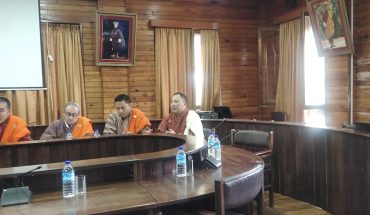
KINZANG DORJI TSHERING | Thimphu
As Bhutan continues consolidating smaller schools into central schools, many teachers in rural areas say that while the move has brought improved educational resources, it has also affected the emotional well-being of students and the social identity of villages. School mergers have changed the learning environment for children, especially those who now must travel long distances or live in hostels away from their families.
At Chaling Primary School in Trashi Yangtse, which currently has 83 students, teacher Dorji Khandu shared that the shift toward central schools has had a mixed impact. He explained that while larger schools provide more facilities and learning materials, the change has been emotionally difficult for many children who previously studied closer to their families.
“When students have to move away from home at a young age, it affects their emotional stability,” said Dorji Khandu. “Some children feel homesick and find it difficult to adjust to a new routine. They miss the comfort and support they used to receive at home.” He added that tiredness from long travel hours or hostel routines can affect how well students concentrate in class.
Before some schools were downsized or merged, many of them already faced challenges such as limited infrastructure, low enrolment, and teacher shortages. Dorji Khandu recalled that multi-grade teaching was common. “When one teacher has to teach multiple grades, it becomes difficult to give equal focus to each child. It affects learning outcomes,” he said. Lack of science materials, ICT access, and basic school facilities also limited exposure to modern learning methods.
In Sarpang, Dekiling Middle Secondary School has 426 students, and similar concerns have been raised. Teacher Tshering Yangchen said that the transition to central schooling systems has improved academic resources, but emotional and family-related challenges remain for students.
“Central schools offer good facilities, but adjusting to living far from parents is not easy for many students,” said Tshering Yangchen. She expressed that when students stay in hostels, their interaction with family members becomes limited, which can affect their sense of support and belonging. “Parents used to play a big role in guiding and encouraging their children. When that connection becomes weak, students can feel alone in their learning,” she said.
She also noted that students who travel from remote areas face issues of attendance during bad weather, transportation delays, and fatigue. “Even if the school environment is good, the emotional and physical strain can still affect learning,” she added.
At Damphu Central School, which has around 500 students, teacher Tenzin Wangchuk shared that while central schools provide more learning materials and opportunities, the transition has not been equally positive for every student. “Access to learning materials is easier here, and students have more time to focus on their studies,” he said. “But for children who come from faraway villages, the adjustment to hostel life and living away from family is emotionally challenging.”
He explained that before mergers, teacher shortages often made it difficult to give individual attention to students. “It was hard to manage different learning levels at once,” said Tenzin Wangchuk. He also pointed out that lack of modern infrastructure in smaller schools limited students’ exposure to practical learning and new teaching methods. Declining enrolment in some rural schools also affected school performance and morale.
Teachers also raised concerns about what happens to school buildings once schools in villages are closed or merged. Many abandoned school structures remain unused and deteriorating. Dorji Khandu said these spaces should be repurposed to benefit the community. “The buildings can be used as early childhood centers, literacy classrooms, or local training facilities,” he said. He stressed that communities should be consulted in making such decisions.
Similarly, Tenzin Wangchuk suggested that abandoned school facilities could serve as vocational training centers to equip youth with practical skills. “They can become training grounds for machinery, carpentry, engineering and other skills that help young people find employment,” he said. He added that using these buildings for community development programs would help maintain the social value of the school space.
From a cultural standpoint, teachers expressed that the closure of community schools affects more than just education. Tshering Yangchen explained that schools often function as gathering places for festivals, meetings, and events. “When a school closes, the village loses a place where people come together. It weakens the bond of the community,” she said.
Tenzin Wangchuk added that without a school, the flow of knowledge and information to the village becomes weaker. “If there is no school near the community, children from poor families may lose learning opportunities. The community may fall behind in understanding new ideas and developments. Over time, this can increase illiteracy and reduce rural development,” he said.
Teachers emphasized that decisions regarding school mergers, community involvement, and reuse of school buildings must be carefully balanced so that children do not lose emotional and cultural support while gaining educational opportunities. While central schools offer improved facilities and academic exposure, the emotional well-being of students and the social identity of rural communities must not be overlooked.
As Bhutan continues to reshape its education system, the voices of teachers like Dorji Khandu, Tshering Yangchen, and Tenzin Wangchuk highlight the need for solutions that maintain quality education while safeguarding community values and supporting the emotional needs of children.





